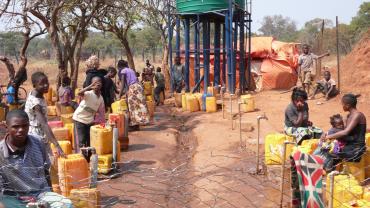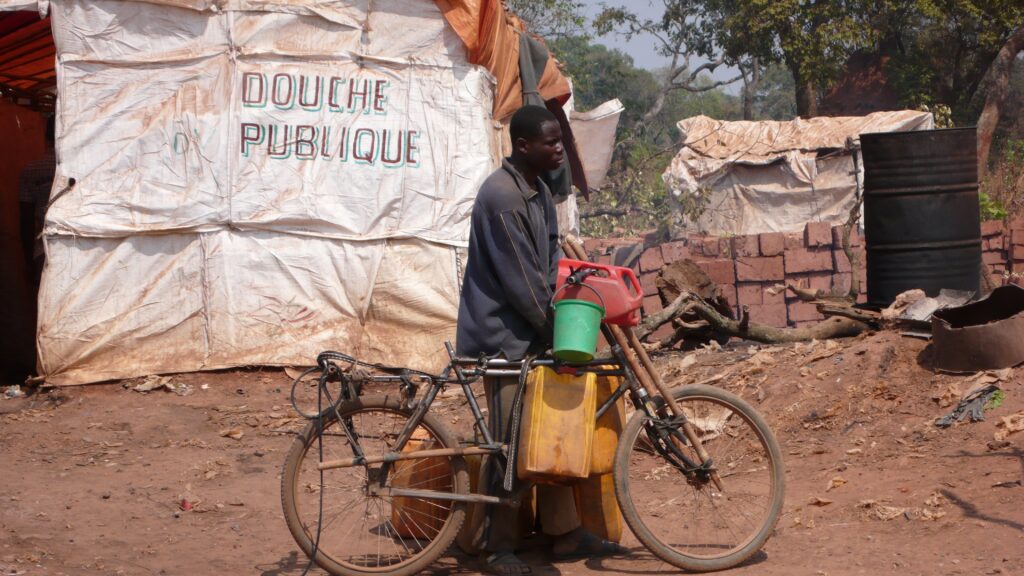En Francais ici.
(London, 23 April 2018) – A British government assessment released today has found Kazakh mining giant, Eurasian Resources Group (ERG, formerly ENRC), flouted the rights of several thousand people living on its cobalt and copper concession in the Democratic Republic of Congo, depriving them of clean water and health care.
The assessment was published by officials at the UK National Contact Point (NCP)- a UK government body for the OECD Guidelines for Multinational Enterprises based at the Department for International Trade.
The UK NCP took up the case after London-based corporate watchdog, Rights and Accountability in Development (RAID), and its Congolese partner, Action contre l’impunite pour les droits humains (ACIDH), brought a complaint against the company in May 2013 on behalf of local communities at Lenge and Kisankala. Both villages are on one of ERG’s concessions in Lualaba Province, formerly Katanga.
When the complaint was first brought, ENRC, as it was then called, was listed on the London Stock Exchange and registered in the UK. It delisted in scandal in November 2013 following reports of poor governance and unscrupulous deals, registering in Luxembourg as a private company under the name ERG.
“ERG seems to view the OECD Guidelines and the UK government’s recommendations on its human rights impact with contempt,” said Anneke Van Woudenberg, Executive Director at RAID. “ERG’s failure to respect the most basic human rights indicates it has little interest in improving the lives of thousands of Congolese harmed by its mining operations.”
Lack of reliable access to clean water was one of the main issues raised in the complaint. The company was aware that water supplies for the villages had been contaminated by previous mining activities and that those who lived there, many of who are subsistence farmers or artisanal miners, had few financial means.

The new assessment follows an earlier 2016 report in which the UK government found ERG’s predecessor, ENRC, had failed to address human rights impacts at mine sites under the control of its subsidiaries in Congo, had not engaged effectively with local communities and had not adequately addressed community’s right to safe drinking water. It set out four recommendations the company should adopt and said the UK government would assess implementation in February 2017.
Although ERG had over a year to comply with the recommendations, RAID and ACIDH reported that ERG had taken few steps to remedy the situation in the villages. The NCP noted in its assessment that ERG had only started to act on the recommendations several months after the initial deadline had expired. Last week, ERG sought to delay publication still further.
The Findings:
In its assessment, based on ERG’s self-reporting measured against feedback from the affected communities obtained by RAID and local Congolese partners, the UK NCP found ERG had:
- Failed to ensure that clean water would be supplied to the local communities. As the assessment notes: “Without any clear guidance or agreed process on how it will be managed in the future, the issue of a permanent water supply is only partially resolved and remains an outstanding obligation.”
- Failed to live up to its requirement to keep the communities informed of the conduct of its staff and security contractors on the site. A consultation process has begun, and rules drawn up but – as the assessment puts it – “…they are still in a draft form and have yet to be enforced.”
- Failed to establish any meaningful development projects to assist people in Lenge. Although company officials belatedly held meetings with some local leaders, the assessment notes that: “no concrete decision had been arrived at to ensure the village had an operational school or health centre.”
Richard Ilungu from AFREWATCH, a Congolese group supporting the communities, said: “The population has nearly lost hope that ERG will ever act to improve their living conditions. They know cobalt is in high demand on the world market, but see few benefits for their communities.”
The NCP complaints process allows the UK government to find a company has breached the OECD Guidelines, but does not provide for any repercussions. RAID and other civil society groups continue to urge the UK to introduce tangible consequences for companies who fail to implement the NCPs’ recommendations.
The UK NCP’s recent findings are in sharp contrast to statements made by ERG’s Executive Director, Benedikt Sobotka, who has sought to draw a line under the company’s previous scandals and says he wants to raise ethical standards. At the Africa Mining Indaba in 2017, Sobotka said ERG “continue[s] investing not only in our own businesses, but in fuelling infrastructure growth and improving the health, wealth and well-being of the communities where we operate.”
“Words about improving the lives of local communities are meaningless if ERG managers take no concrete action to implement standards that govern corporate behaviour,” Van Woudenberg said. “ERG should take immediate steps to fully implement the UK government’s recommendations, compensate victims for any harm done and commit that in future it will adhere to international human rights standards in its operations in Congo and elsewhere.”
Corruption Investigation
The criticism of ERG’s human rights record is the latest allegation of serious misconduct levelled at the renamed company. In April 2013, the UK’s Serious Fraud Office opened a criminal investigation into bribery and corruption by then ENRC officials, including in relation to the company’s acquisitions in Congo.
Notorious Israeli businessman, Dan Gertler, who orchestrated deals leading to ENRC’s acquisition of its mines in Congo, is part of the investigation, according to an SFO letter leaked to the press. In September 2016, the US authorities charged and fined Och-Ziff, the hedge fund which had backed some of Gertler’s Congolese acquisitions, including his deals with ENRC. Och-Ziff paid $412 million in combined civil and criminal penalties for admitting its role in bribery and corruption, one of the largest fines on Wall Street. Transactions with ENRC, which were part of the “DRC Corruption Scheme,” are readily identifiable in legal documents released by the US Department of Justice. The SFO’s corruption investigation into ENRC continues.
Gertler and his companies were sanctioned by the US Treasury in December 2017 as part of clampdown on human rights abusers and corrupt actors. According to the US Treasury, Gertler amassed his fortune through “hundreds of millions of dollars’ worth of opaque and corrupt mining and oil deals in [Congo].” It estimated that between 2010 and 2012, Congo “reportedly lost over $1.36 billion in revenues from the under- pricing of mining assets that were sold to offshore companies linked to Gertler.”
For details on RAID’s work on ERG click here.

